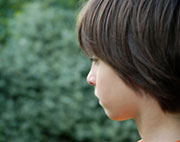- 8 Ways to Increase Dopamine Naturally
- 7 Best Breads for Maintaining Stable Blood Sugar
- Gelatin vs. Collagen: Which is Best for Skin, Nails, and Joints?
- The Long-Term Effects of Daily Turmeric Supplements on Liver Health
- Could Your Grocery Store Meat Be Causing Recurring UTIs?
- Are You Making This Expensive Thermostat Error This Winter?
- Recognizing the Signs of Hypothyroidism
- 10 Strategies to Overcome Insomnia
- Could Artificial Sweeteners Be Aging the Brain Faster?
- Techniques for Soothing Your Nervous System
Many Kids With Autism on Multiple Medications, Study Finds

TUESDAY, Oct. 22Children with autism in the United States routinely take one or more prescription medications, even though little evidence exists regarding the drugs’ safety or effectiveness for treating the neurodevelopmental condition, a new study finds.
The study of almost 34,000 children with an autism spectrum disorder found nearly two-thirds were prescribed at least one medication. Within that group, more than one-third were given two medications, and one in seven took three drugs.
“There are a lot of children who are being treated with psychotropic medications with unknown effects for benefits and harms,” said the study’s senior author, Dr. Anjali Jain, a managing consultant with the Falls Church, Va.-based Lewin Group, a health care consulting firm.
“I hope everyone — parents and providers — will consider these medications with caution,” she added.
Children with autism have impaired communication and social skills, and often exhibit repetitive behaviors. In the United States, about one in 88 children has been diagnosed with an autism spectrum disorder, which can range from mild, as in Asperger syndrome, to severe autism.
The study, released online Oct. 21 in Pediatrics, looked at the use of psychotropic medications, which includes seizure medications, antidepressants, antipsychotics, attention-deficit/hyperactivity disorder (ADHD) drugs, lithium (a drug that treats manic behavior), and Parkinson’s drugs for kids and young adults with autism. The more commonly prescribed medications were antidepressants, antipsychotics and ADHD drugs, or combinations of them, Jain said.
Many of these medications are prescribed for other, co-existing disorders, such as depression or ADHD. The problem is that in people with autism, “it can be really hard to disentangle which behavior goes with which disorder,” said Jain.
Dr. Paul Wang, senior vice president of medical research for Autism Speaks, an autism advocacy organization, agreed. “It’s challenging to diagnose someone within the context of an autism spectrum disorder,” he said. “They can’t necessarily tell you if they’re anxious or depressed. And if they’re not paying attention, is that a sign of ADD or are they fixated on something else due to the autism spectrum disorder?”
It’s also possible that something entirely unrelated is aggravating symptoms, Wang added. “Some of these kids may not have been thoroughly evaluated for a physical condition. You may have a child with an earache who can’t express what’s going on, and that might manifest as irritable or aggressive behavior,” he noted.
Behaviorally based treatments, perhaps including parent training, are generally the first line of therapy for children with autism spectrum disorders. But because children with autism are such a varied group, “it’s hard to come up with a treatment that covers every child,” Jain said.
The only medications approved by the U.S. Food and Drug Administration to treat autism spectrum disorders are risperidone (Risperdal) and aripiprazole (Abilify), antipsychotics that are prescribed for treating irritability and aggression. Other medications can be prescribed in what’s known as an “off-label” use. However, that means there is likely little information on how they might affect someone with autism or on possible side effects.
The current study points to a need for more research into the effects these drugs have on children with autism, Jain and Wang said.
The researchers examined data on 33,565 children and young adults — age 20 and under — diagnosed with an autism spectrum disorder and insured through a large commercial insurer in the United States.
The investigators found that 64 percent of the children had at least one prescription filled for a psychotropic medication. From this group, 35 percent had prescriptions filled for two or more psychotropic medications, and 15 percent had prescriptions for three or more psychotropic drugs concurrently.
Among the youngsters who took more than one medication, they did so for 346 days on average, according to the study.
Older children, kids who had seen a psychiatrist and those diagnosed with an additional condition, such as depression or seizures, were more likely to have been prescribed one or more psychotropic medications, the study found.
“The study couldn’t tell why older children were more likely to receive psychotropic medication, but one reason could be that the doctor’s comfort level with medication in older children is greater,” Jain said.
“Another potential reason is that doctors may have started a younger child on behavioral therapy that hasn’t worked for every symptom, and now they want to try medications for the remaining symptoms,” she added.
Also, behaviors in an older, larger child might become harder to manage, these experts suggested. “A challenging behavior in a big teenage boy with an autism spectrum disorder will make a parent and a doctor more willing to try medication than the same behavior in a smaller 4-year-old,” said Wang.
More information
The U.S. Centers for Disease Control and Prevention has more about treatment for kids with autism.
Source: HealthDay
Copyright © 2026 HealthDay. All rights reserved.










